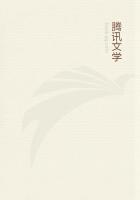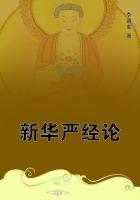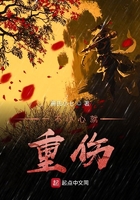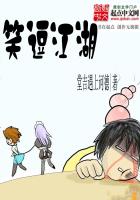This refers, of course, to the reception pioneers of Nietzsche's stamp meet with at the hands of their contemporaries.
Par. 8.
Nietzsche teaches that nothing is stable,--not even values,--not even the concepts good and evil. He likens life unto a stream. But foot-bridges and railings span the stream, and they seem to stand firm. Many will be reminded of good and evil when they look upon these structures; for thus these same values stand over the stream of life, and life flows on beneath them and leaves them standing. When, however, winter comes and the stream gets frozen, many inquire: "Should not everything--STAND STILL?
Fundamentally everything standeth still." But soon the spring cometh and with it the thaw-wind. It breaks the ice, and the ice breaks down the foot-bridges and railings, whereupon everything is swept away. This state of affairs, according to Nietzsche, has now been reached. "Oh, my brethren, is not everything AT PRESENT IN FLUX? Have not all railings and foot-bridges fallen into the water? Who would still HOLD ON to 'good' and 'evil'?"Par. 9.
This is complementary to the first three verses of par. 2.
Par. 10.
So far, this is perhaps the most important paragraph. It is a protest against reading a moral order of things in life. "Life is something essentially immoral!" Nietzsche tells us in the introduction to the "Birth of Tragedy". Even to call life "activity," or to define it further as "the continuous adjustment of internal relations to external relations," as Spencer has it, Nietzsche characterises as a "democratic idiosyncracy." He says to define it in this way, "is to mistake the true nature and function of life, which is Will to Power...Life is ESSENTIALLY appropriation, injury, conquest of the strange and weak, suppression, severity, obtrusion of its own forms, incorporation and at least, putting it mildest, exploitation." Adaptation is merely a secondary activity, a mere re-activity (see Note on Chapter LVII.).
Pars. 11, 12.
These deal with Nietzsche's principle of the desirability of rearing a select race. The biological and historical grounds for his insistence upon this principle are, of course, manifold. Gobineau in his great work, "L'Inegalite des Races Humaines", lays strong emphasis upon the evils which arise from promiscuous and inter-social marriages. He alone would suffice to carry Nietzsche's point against all those who are opposed to the other conditions, to the conditions which would have saved Rome, which have maintained the strength of the Jewish race, and which are strictly maintained by every breeder of animals throughout the world. Darwin in his remarks relative to the degeneration of CULTIVATED types of animals through the action of promiscuous breeding, brings Gobineau support from the realm of biology.
The last two verses of par. 12 were discussed in the Notes on Chapters XXXVI. and LIII.
Par. 13.
This, like the first part of "The Soothsayer", is obviously a reference to the Schopenhauerian Pessimism.
Pars. 14, 15, 16, 17.
These are supplementary to the discourse "Backworld's-men".
Par. 18.
We must be careful to separate this paragraph, in sense, from the previous four paragraphs. Nietzsche is still dealing with Pessimism here; but it is the pessimism of the hero--the man most susceptible of all to desperate views of life, owing to the obstacles that are arrayed against him in a world where men of his kind are very rare and are continually being sacrificed. It was to save this man that Nietzsche wrote. Heroism foiled, thwarted, and wrecked, hoping and fighting until the last, is at length overtaken by despair, and renounces all struggle for sleep. This is not the natural or constitutional pessimism which proceeds from an unhealthy body--the dyspeptic's lack of appetite; it is rather the desperation of the netted lion that ultimately stops all movement, because the more it moves the more involved it becomes.
Par. 20.
"All that increases power is good, all that springs from weakness is bad.
The weak and ill-constituted shall perish: first principle of our charity.
And one shall also help them thereto." Nietzsche partly divined the kind of reception moral values of this stamp would meet with at the hands of the effeminate manhood of Europe. Here we see that he had anticipated the most likely form their criticism would take (see also the last two verses of par. 17). Par. 21.
The first ten verses, here, are reminiscent of "War and Warriors" and of "The Flies in the Market-Place." Verses 11 and 12, however, are particularly important. There is a strong argument in favour of the sharp differentiation of castes and of races (and even of ***es; see Note on Chapter XVIII.) running all through Nietzsche's writings. But sharp differentiation also implies antagonism in some form or other--hence Nietzsche's fears for modern men. What modern men desire above all, is peace and the cessation of pain. But neither great races nor great castes have ever been built up in this way. "Who still wanteth to rule?"Zarathustra asks in the "Prologue". "Who still wanteth to obey? Both are too burdensome." This is rapidly becoming everybody's attitude to-day.
The tame moral reading of the face of nature, together with such democratic interpretations of life as those suggested by Herbert Spencer, are signs of a physiological condition which is the reverse of that bounding and irresponsible healthiness in which harder and more tragic values rule. Par. 24.

